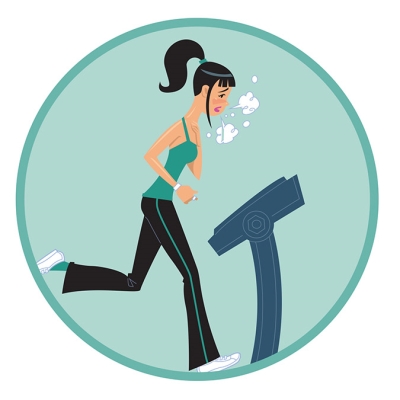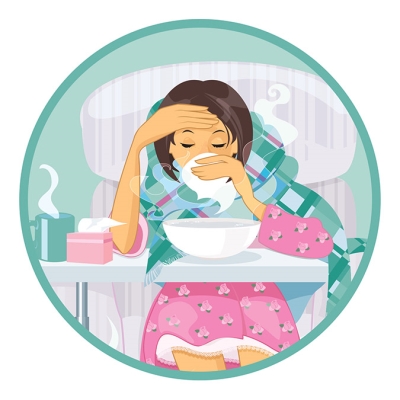I can never remember what to do when I have a cold.
Starve it? Feed it? Cool bath or warm sauna?
I’ve tried
Vicks on my feet, chicken broth, and even crushed garlic in a glass of milk
(I was trapped and held hostage by my friend’s grandmother).
Here’s what worked the best: acting pitiful so my husband kept the
kids away.
Granted, this only worked once.
“Sweating it out” is not something I’ve tried because heat makes me grumpy.
But it is common cold-busting advice, so I was asked to write a blog about
whether heat can cure a cold or if it is just … a bunch of hot
air. I found out “sweat it out” means different things to
different people, ranging from intense workouts to eating hot peppers.
Aside from curries and jalapenos, however, the “sweat it out”
methodology
boils (pardon my pun) down to two categories:
actual sweating or inhaling warm, moist air.
 Actual Sweating
Actual Sweating
Sweat-producing exercise MAY temporarily relieve symptoms because of the
feel-good endorphins it releases but it is unlikely to cure a cold. The
purpose of sweat is to cool your body down, which is why high fevers cause
perspiration. Creating sweat through exercise temporarily increases your
body temperature as a fever would, but it is not enough to reduce the
amount of cold virus in your body.
If you feel up to working out, go for it; but don’t force yourself
to maintain your normal routine. If you have fever or a severe cough or
wheezing, ask your healthcare provider if exercise is a good idea. It
may be best to take a few days off.
There’s talk that sweat will rid your body of
toxins. There are some studies that detected small amounts of some toxins, but
the kidneys and liver filter out substantially more toxins than those
sweat glands could ever hope for. There is no evidence that “sweating
it out” improves health. In fact, for some people it could be very
dangerous. Sweat is primarily water with some small amounts of electrolytes;
activities that cause sweating require fluid replacement otherwise you
will become dehydrated which will complicate a cold. Worse, forcing your
body to sweat can make your kidneys hold on to all the water they can.
This sounds OK until you remember that the water that goes to the kidneys
is full of toxins. If the kidneys are forced to conserve water, they will
do it by not filtering out the toxins.
 Inhaling Warm Steam
Inhaling Warm Steam
Breathing in warm steam can temporarily relieve congestion by loosening
mucus, but there is not a lot of evidence to support it. In fact, there
are accounts of severe illness and even death from overheating in sweat
lodges or
saunas. Heat stroke is a real thing, my friends. The Cochrane Database of Systematic
Reviews are the highest standard in evidence-based healthcare;
according to them, breathing in hot air does not produce a cure or even reduce the amount
of virus in your body. If a steamy shower or humidifier relieves your
symptoms, go for it (unless your provider advises differently). Just be
sure to clean your humidifier according to manufacturer instructions because
there are bacteria that love to set up camp in wet areas. The last thing
you want is your humidifier to release other germs into the air!
So here’s the rub … exercise and humidity make temporarily make you feel better by relieving
congestion and giving you a boost of endorphins. They won’t cure
you or shorten the illness, though. More importantly, if not done with
care, you could end up worse off than when you started. Steam burns, feeling
lightheaded, and dehydration are a few of the things you will need to
be careful of.
Hey, but what about the garlic milk?
In case you are tempted (or held hostage by someone’s grandma),
the garlic milk did not work. Chicken soup can be good for you but it’s
not a cure.
Vicks? Well, see below.
Remember that tidbit about Vicks on the feet?
Neuroscientists are smart. Really smart. These aren’t the kind of
folks that are persuaded by old wives’ tales and other medicinal
folklore. They are, however, the kind of folks that will research and
test ideas. Two neuroscientists, one the winner of a Nobel Prize, discovered
preventing muscle cramps is less about the muscle and more about the nerves.
Treating the misfiring nerve will stop the cramps, or so the story goes.
I have known runners who drink pickle juice or concoctions involving curry
or hot sauce to stop muscle cramps. They swear by it despite being accused
of quackery. Well, now there is evidence suggesting that this may actually
work, but not for the reasons we assumed. Pickle juice was believed to
provide fluid and electrolytes. I’m not sure what curry does, my
friends joked that maybe it just made the body focus on something more
important … a burning palate. It turns out that maybe the stimulation
of the nerves in the mouth, esophagus and stomach is actually calming
overstimulated nerves in other parts of the body.
Neuroscientists are smart but not smart enough to master all of neurobiology.
Our neurological system is incredibly complex. There is still much we
don’t know, especially on how sensory nerves in one area can affect
how our body functions in another. What these two neuroscientists are
trying to show is that stimulation of nerves in the mouth affected the
spinal column which overwhelmed the nerves that were misfiring and causing
cramps. Those nerves responded by chilling out (not a scientific term)
and the muscles were grateful and stopped cramping.
How does this relate to menthol, camphor and eucalyptus oil on the feet? One
pharmacologist is speculating that if we misunderstood muscle cramps, have we also misunderstood
coughs? In other words, we assumed muscle cramps were about the muscle
so we treated the muscle and dismissed those that swore tonic water and
spoonfuls of mustard at night stopped their leg cramps. What if coughs
can be reduced by overstimulating some nerves, and those nerves happen
to be in the feet? That could explain why slathering the feet with mentholated
ointments is the home remedy people swear by.
Mind you, this is all speculation. If you have a cough, see your healthcare
provider. There is no evidence to suggest that mentholated ointments are
a treatment or cure for coughs, and the science is young and limited regarding
whether spicy foods stop muscle cramps.
The verdict: Pickle juice and mentholated feet remain urban legend, with a caveat.
The research is sparse and low-quality, but interesting and I expect some
better studies will start trickling in.
In the meantime, stay hydrated, eat well, and see your healthcare provider
for coughs, cramps, and other concerns.
Important note: Every reputable, or mostly reputable, place I looked emphasized that Vicks
and similar products should not be used at all on children under the age of two.
Kate Craig, BSN, RN, is the Administrative Director of Nursing at
The Legacy Living and Rehabilitation Center in Gillette, Wyoming.